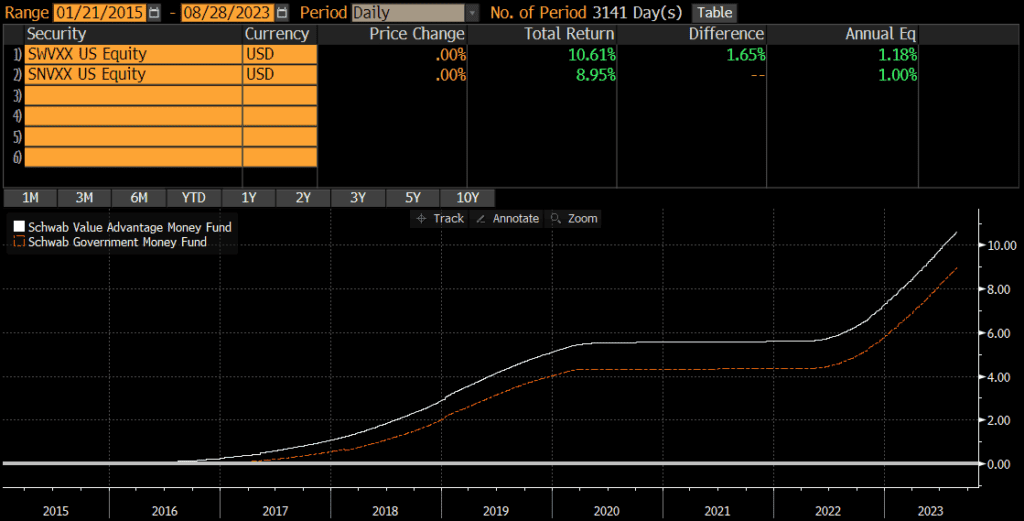Schwab offers dozens of money market mutual funds, including many with similar sounding names. Two of the largest funds in the marketplace today are the Schwab Government Money Fund (SNVXX) and the Schwab Value Advantage Money Fund Investor Shares (SWVXX). Comparing SNVXX vs SWVXX may be confusing because the name and fund details are similar, although there is one important difference.
The Short Answer
When comparing SWVXX vs SNVXX, the main difference is that SWVXX is a prime fund while SNVXX is a government fund. This means that SNVXX primarily owns government-backed securities, while SWVXX owns all types of assets. Therefore, SWVXX is theoretically riskier and generates a higher yield.
SNVXX vs SWVXX Historical Performance
Since their common inception, SWVXX has outperformed SNVXX by over .18% annualized. This has compounded to a 1.65% cumulative difference over the past 8+ years. SWVXX currently yields .18% more than SNVXX, so I would expect this outperformance to continue. It is not uncommon for prime funds to outperform their non-prime counterparts.

Current Yields for SWVXX & SNVXX
The current 7 day yield is a standardized yield metric for money market mutual funds and the 7 day yields for both SNVXX and SWVXX can be found on the fund’s webpages. See here for SNVXX and here for SWVXX.
What rate is SNVXX & SWVXX paying?
The current interest rate for SNVXX, SWVXX, and other Schwab money markets can be found on Schwab’s money market page.
SNVXX & SWVXX Details
The expense ratio for both SNVXX and SWVXX is .34%. Neither fund charges a load or 12b-1 fees.
Neither SNVXX nor SWVXX has a minimum investment and investors can invest as little as one cent. Each fund has lower-cost share classes, which are mentioned below.
I have not checked every brokerage, but SNVXX and SWVXX are generally only available to clients of Schwab.
Like most money market mutual funds, investors can sell SNVXX or SWVXX at any time.
SNVXX vs SWVXX Risks
Hypothetically, an investor could lose money with SNVXX or SWVXX, but I personally do not think that is a realistic risk as I believe the fund sponsor or the federal government would intervene if that were about to happen. Technically, it is possible to lose money in SWVXX or SNVXX though.
It is important to note that SWVXX is a prime fund and holds some non-government assets, which have been and are perceived to be riskier than government assets. So, again, hypothetically (and technically) SWVXX is the riskier of the two funds.
As of June 30, 2023, SNVXX’s portfolio was nearly $18 billion, while SWVXX was nearly $130 billion.
IS SNVXX or SWVXX FDIC Insured?
No, neither SNVXX nor SWVXX are FDIC insured.
Holdings
The two funds both invest in short-term securities, but SNVXX only invests in government-backed securities. As a prime fund, SWVXX invests in non-government debt like commercial paper and CDs. Most of SNVXX’s holdings are in government repurchase agreements (76%) and agency debt (22%) among other things. SWVXX holds 43% in government repurchase agreements and 25% in CDs, as well as smaller positions in other government and non-government assets.
Tax Considerations
SNVXX is a government fund, which means that it invests in government securities. SWVXX is a prime fund which means that it can invest in a wider variety of instruments. This means that SNVXX is a bit more tax-efficient for those who are subject to state taxes. However, investors subject to state tax should consider a “Treasury only” fund like SNSXX, since a much greater proportion of the income will be exempt from state tax. Also, taxable investors may find better after-tax yields in municipal (muni) money market funds, which offer tax benefits that may improve investors’ after-tax yield.
Treasuries and Treasury Money Markets
Treasuries are treated very differently than other money market assets (including Treasury repos) for tax purposes. Income from government repos (that both SWVXX and SNVXX own) is subject to state income tax. Income from Treasury bonds is exempt from state income tax. Therefore, SWVXX is generally a better choice for any investor subject to state tax, although a Treasury-only fund would be even better (depending on yields).
Muni Money Market Funds
Investors subject to higher tax rates may consider municipal (muni) money market funds due to the fact the interest is typically exempt from federal income tax (and often from state tax too!).
The caveat with muni money market funds though is that the yields can move up and down A LOT. Therefore, the stated yield that an investor looks up on any given day is not necessarily indicative of the future return. To understand why, read my post on muni money market yields.
Rather than expecting a muni money market fund’s stated yield, I encourage investors to expect the trailing average yield (over the past few weeks). Generally speaking, the after tax returns of munis will only be higher than non-muni money markets for those in the highest tax brackets.
High Balances
Investors allocating more than $100,000 may want to consider the “ultra” share class of SNVXX (which is SGUXX) or SWVXX (which is SNAXX)
Is SNVXX or SWVXX a Better Fund?
As mentioned above, SWVXX has outperformed in the past and I expect that to continue given the its higher yields. This higher yield comes from holding riskier investments and prime funds are theoretically riskier (I say theoretically because the federal government often intervenes if the financial system is at risk). However, some of of SNVXX’s income is exempt from state tax, so the after-tax yield is higher for investors subject to state taxes. These investors may want to invest in a Treasury only fund like FDLXX though, where they may be able to get both a higher after-tax yield and more safety.